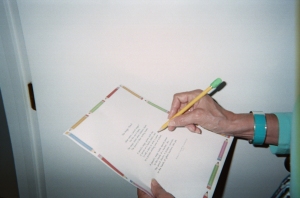Hi and welcome back to Attention-ology for K – 5 Teachers!
“What did you do over the weekend?” I overheard a fourth grade teacher ask a colleague in the teachers’ “lounge” at lunchtime. “SLEPT!” she replied, with a voice that capitalized every letter in the short word. “That’s all I seem to want to do on the weekends,” she continued. “I’m exhausted from work.”
Obviously stressed by the demands of educating kids of any age in the age we’re in, we teachers (and parents) sometimes forget, I think, that students – children – feel just as pressed. No wonder a lot of kids “go blank” when I ask them to think up an idea for a story or a poem.
Ah, but that’s before I whip out The Magic Pencil.
In every class I teach, there are at least a few students who seem lost at the mention of using their imaginations to begin a story or a poem.
Before I ask students to begin writing, we visit “the wonderful world of words” where I help kids see how elements of good writing form a circle around the ♥ of a story or a poem (more about “the wonderful world of words” in a later blog).
After we discuss must-include writing elements, I suggest that my students spend a few minutes reviewing their story or poem planning pages – brainstorming resources distributed to them at an earlier time. Brainstorming times always causes some hands to fly with guilty-looking or questioning faces that say either, “Whoops, I didn’t do my planning homework” OR, “I can’t think of anything to write about.”
You guessed it…it’s almost time for The Magic Pencil. But, I wait to allow time for young minds to kick into gear, for students to feel the satisfaction of dreaming up ideas all by themselves.
That never happens, though, not for all of my students in any class, and that’s when I reach into my teaching bag and pretend to discover something really special… “Look!” I raise a joyful voice as I hold up and point to the pencil in my hand and say, “Imagine that THIS IS A MAGIC PENCIL! I extend the pencil towards the class so that everyone can look more closely at its form. It’s an ordinary pencil, but to see the looks on students’ faces you would think they’d never seen a pencil before. That’s the magic of the tool and the trick!
“Wouldn’t it be wonderful,” I offer, “if every time you touched The Magic Pencil to your paper, it would write the story for you.” Inevitably, someone in the back of the class yells, “Wow, that would be great!” “Oh, and how about this,” I continue…pointing excitedly to the large eraser on the pencil’s end. “How cool would it be if every time you make a spelling mistake while you’re writing,” (I pause until I see that all eyes are still on me) “this Magic Pencil would do a flip” (I demonstrate the fast action) “and touch the eraser to the paper.” “Presto – automatic correction!” I conclude my dramatic presentation of an ordinary, turned magical, tool that helps jumpstart students’ writing.
By now, the kids are cheering for The Magic Pencil. Then the challenge is to settle everyone down in what I call their “private writing zones” where imagination and focus team up for good work.
By the way, teachers can apply The Magic Pencil to areas of the curriculum other than writing. For example, what student wouldn’t love to have a Magic Pencil to help with math problems. The “magic” may relieve some of the stress students feel when they approach math in the first place, especially when it’s not their best subject. Experiment and see what works best for your class.
The more I teach, the more I see that The Magic Pencil isn’t just for students. We teachers make pencils magical, too. Here’s how I describe the magic…Hope you enjoy it…
The Magic Pencil
What makes a pencil magic?
Not the way it looks,
The magic starts when children touch
The pencil to their writing books.
A pencil’s magic grows each day
It serves as a handy child’s tool
To tell a story or write a poem
In a private writing zone at school.
The pencil’s magic holds special power
In the hands of a teacher, too.
The pencil checks, it praises, corrects,
In the hands of gifted teachers, like you.
Remember, you don’t need to be a magician to work magic in instructional settings!
Talk with you next week,
Barbara ♥ The Lovable Poet


